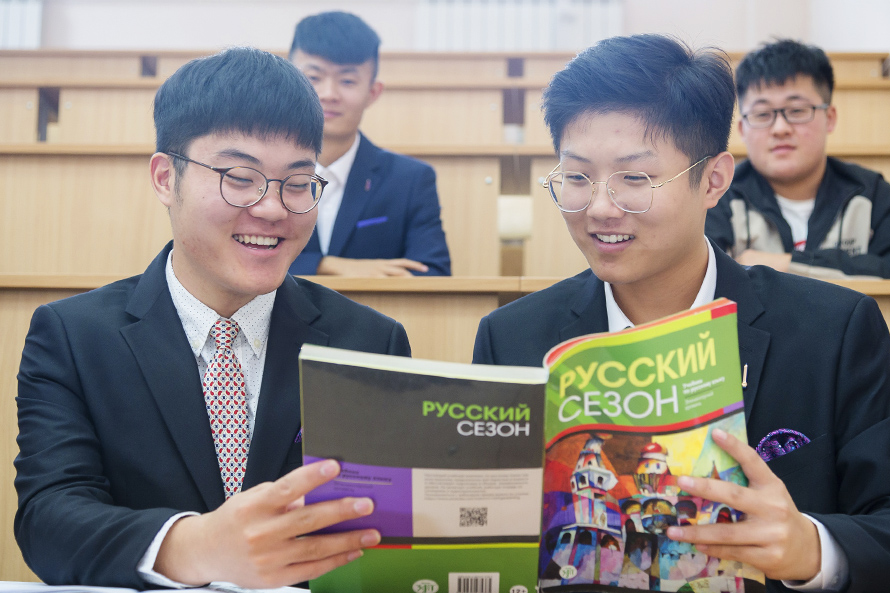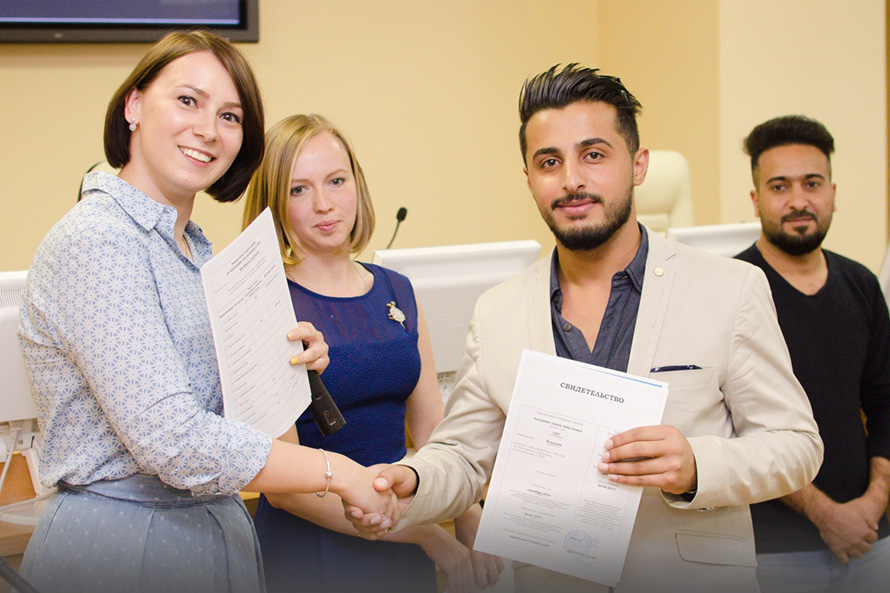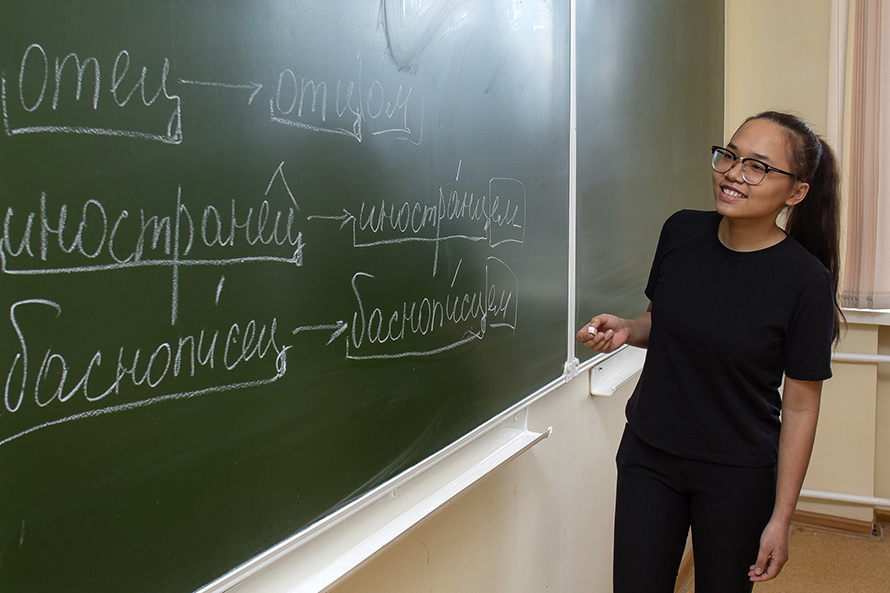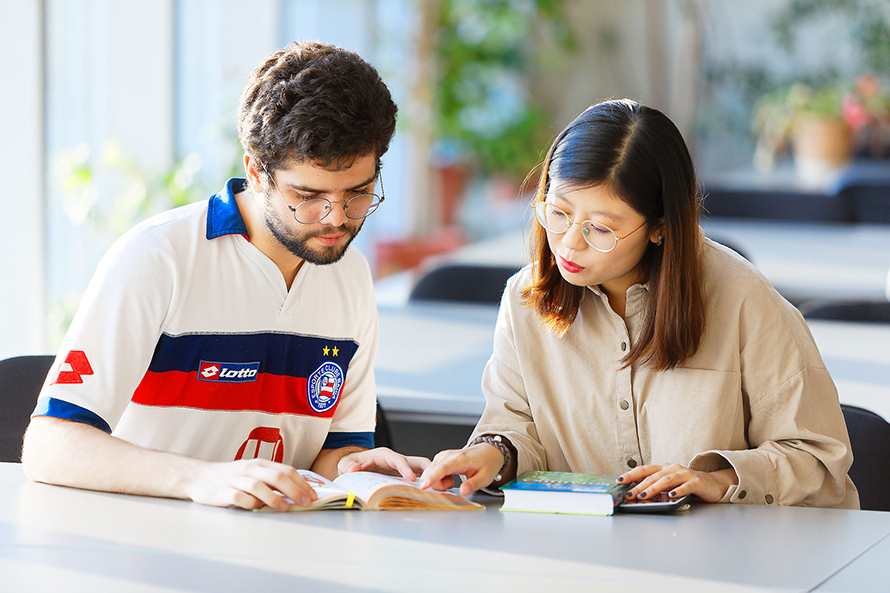Learning Russian is popular among prospective international students. Following is an overview of Russian language study options.
The learners’ goals can differ: for some people, studying foreign languages is a hobby, some plan to enrol in Russian-taught programmes, while others are set to make Russian their professional occupation. Distance learning would be sufficient in the first case. Onsite training is for those who plan to take degree programmes in Russian. To become a specialist in the Russian language, you have to complete undergraduate or graduate programmes.
Online courses
Online courses are for those who want to study Russian but cannot come to Russia. You can take an online course from any location in the world: a computer with access to the Internet is all you need. Such courses are available at several Russian universities.
For example, South Ural State University offers Massive Open Online Phonetics Course, designed by the Russian as a Foreign Language Department under the SUSU Institute of Open and Distance Education. Virtual Language Laboratory is another SUSU product. It can be used to check one’s pronunciation and find out if your articulation of Russian words is correct.
Higher School of Economics offers free online courses “Russian as a Foreign Language” (video course, Level A1), “Russian as a Foreign Language” (video course, Level A2), and a spoken Russian online course “As You Say” (Level B1+).
RUDN University offers free language courses such “Russian from Scratch”, “We Speak with the Whole World in Russian”, and “Russian Verbs of Motion.”
National Research Nuclear University MEPhI runs two free online courses: “Russian as a Foreign Language (Scientific Style)” and “Academic Writing in Russian and English.”
National University of Science and Technology MISIS offers “Russian Language Course for Engineering Professions” to foreigners who plan to apply to Russian engineering universities. The initial proficiency level has to be at B1 or higher.

© SUSU
Onsite Russian language courses
Onsite courses provide a more thorough training thanks to immersion in the language environment. Many courses are focused on in-depth study of field-specific vocabulary. Learners are offered short-term courses (two weeks or more), and long-term multi-level courses from Level A1 to C1. Sometimes language courses are included in specialised foundation programmes (i.e. students study not only the language, but also field-specific subjects which they will need in further training). This kind of training is provided by Preparatory Departments for foreigners. Find more information about Preparatory Departments here. Some universities offer Russian language summer schools comprising language courses and a Russian-medium cultural programme.
Kazan Federal University has 12- and 18-month Russian language courses for foreign nationals starting 1 September and 10 February, respectively. Tuition fee: 115,200 rubles ($1,772) for the yearly programme and 172,800 rubles ($2,646) for the 18-month programme.
South Ural State University offers several courses to students who want to improve their Russian including “Russian for Special Purporses (252 hours, 30,000 rubles/$461) and “Russian Language in Professional Communication” (360 hours, 40,000 rubles/$615).
Higher School of Economics has 504-hour Russian language courses tailored to any level; groups are formed with the same proficiency levels. Period of study: February 2020 – July 2020 (one semester). Tuition fee: 96,400 rubles ($1,483).
Tomsk Polytechnic University offers many courses for beginners and intermediate learners of Russian designed for various levels of initial proficiency, group size, intensity and length of study (minimal length is ten classroom hours). Tuition fee: 300 to 850 rubles ($4-$13) per hour depending on parametres.
Petrozavodsk State University offers 4- to 16-week language courses. Tuition fee (depends on the length of study and group size): 28,000 to 402,200 rubles ($431 – $6,188).
© TPU
RUDN University offers an intensive eight-week course “Russian as a Foreign Language” for 44,280 rubles ($682), and two-week summer course “Let’s Speak Russian” for 34,000 rubles ($551).
Saint Petersburg Electrotechnical University "LETI” offers a variety of short summer courses: “Russian Language and Cultural Heritage of Russia” (29 June – 5 July 2020, tuition fee: 15,000 rubles ($231), “Gems of Russian Culture in Russian Language,” 29 June – 12 July 2020, tuition fee: 30,000 rubles ($461), “Intensive Course of Russian for Beginners (Level A1)” and “Intensive Course of Russian Upperintermediate” (Level A2-B1), 3-30 August 2020, fee: 40,000 rubles ($615). The tuition fee for the same course for Level B2 or higher with the same period of study is 30,000 rubles ($462). All LETI courses include much out-of-class learning through sightseeing tours (included in the fee), quests and training sessions.
Siberian Federal University’s “Russian Language Summer Course” (160 classroom hours) is designed for students who want to raise their proficiency level. Classes are held from 1 July to 31 August; tuition fee: 35,000 rubles ($538).
TRKI Preparation and Exam
You have to take the Test of Russian as a Foreign Language (TRKI/TORFL) to prove your proficiency in Russian. Some Russian universities have official TRKI centres that offer TRKI preparation courses and hold the examination.
For example, the TRKI exam can be taken at the Peter the Great St. Petersburg Polytechnic University Test Centre. It also runs classes to prepare students for TRKI-1 and TRKI-2. The course comprises five lessons, each lasts two classroom hours. Tuition fee: 4,200 rubles (60 euros). The University has a long-term TRKI-1 preparation course. Length of study is ten months; tuition fee is 170,000 rubles ($2,615).

© SUSU
Tomsk Polytechnic University has a TRKI Centre, too. It offers 36-hour intensive courses for various levels (A1, A2, B1 and B2) to prepare for TRKI. Tuition fee: 10,800 ($166) for group training; 850 rubles per hour for one-on-one training. Peoples’ Friendship University of Russia offers two-week TRKI-1 courses for 38,500 rubles ($592); after completing the course, students can take the exam at the RUDN TRKI Centre. The TRKI exam can also be taken at the Petrozavodsk State University Linguistic Centre.
Siberian Federal University operates the regional TRKI-1 and TRKI-2 preparation and test centre for foreign nationals. An intensive 18-hour TRKI preparation course costs 2,200 rubles ($34).
Higher School of Economics offers an onsite TKRI preparation course for 96,400 roubles ($1,483). HSE specialists designed an online test in Russian; applicants can take it to assess their level. A similar online test is available on the National Research Nuclear University MEPhI website.
Russian Language as Professional Occupation
To make Russian your specialty, you have to get higher education, i.e. to complete undergraduate or graduate programmes. Many Russian universities provide this opportunity to prospective international students.
A Kazan Federal University undergraduate programme in Linguistics requires four years of study; tuition fee is 142,500 rubles ($2,192) a year. Graduate programme length of study is two years; tuition fee is 162,000 rubles ($2,492) a year.
The Siberian Federal University School of Philology and Language Communication offers an undergraduate programme in Linguistics for 194,720 rubles ($2,303) a year; the available specialisation is “Russian and English Languages for International Students.”
SUSU offers a graduate programme in philology “Russian as a Foreign Language.” Tuition fee: 160,000 rubles ($2,460) a year.

© MIPT
Novosibirsk State University designed a comprehensive cultural programme for international master’s students “Russian Language, Literature and Culture.” It trains teachers and translators with a powerful background in the humanities. They can be employed at joint ventures and cultural organisations interacting with Russia. Tuition fee: 3,000 (195,000 rubles) a year.
Peoples’ Friendship University of Russia has a master’s programme for teachers “Russian as a Foreign Language.” Length of study is two years; tuition fee: 265,000 rubles a year for CIS nationals; $4,100 for citizens of other countries.
In 2019, National University of Science and Technology MISIS launched an international graduate linguistics programme “Second Language Teaching and Pedagogical Design in Digital Environments.” The programme includes a course in Russian as a foreign language. Tuition fee: 225,000 rubles ($3,461) a year.
Regardless of the university you choose, it is obvious that Russia is the best place for studying Russian, especially if you plan to make it your specialty. After you choose the appropriate programme, sign into our website and apply to the university; it’s free. The university will reply to you within ten workdays.



























































